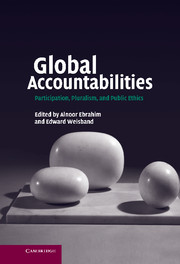Book contents
- Frontmatter
- Contents
- List of tables
- List of figures
- Acknowledgments
- List of contributors
- 1 Introduction: forging global accountabilities
- Part I Public accountability: participatory spheres from global to local
- Part II Experiments in forging NGO accountability: mutuality and context
- 5 Multiparty social action and mutual accountability
- 6 Not accountable to anyone? Collective action and the role of NGOs in the campaign to ban “blood diamonds”
- 7 Bringing in society, culture, and politics: values and accountability in a Bangladeshi NGO
- Part III Reflective accountability: new directions for participatory practices
- Part IV Global accountability frameworks and corporate social responsibility
- Index
- References
5 - Multiparty social action and mutual accountability
Published online by Cambridge University Press: 22 September 2009
- Frontmatter
- Contents
- List of tables
- List of figures
- Acknowledgments
- List of contributors
- 1 Introduction: forging global accountabilities
- Part I Public accountability: participatory spheres from global to local
- Part II Experiments in forging NGO accountability: mutuality and context
- 5 Multiparty social action and mutual accountability
- 6 Not accountable to anyone? Collective action and the role of NGOs in the campaign to ban “blood diamonds”
- 7 Bringing in society, culture, and politics: values and accountability in a Bangladeshi NGO
- Part III Reflective accountability: new directions for participatory practices
- Part IV Global accountability frameworks and corporate social responsibility
- Index
- References
Summary
Accountability in multiparty initiatives is an issue for many actors, from governments to businesses to civil society organizations. This chapter focuses on multiparty social action initiatives that seek solutions for complex, uncertain, and changing social problems.
The accountability problem is particularly acute for cause-oriented civil society organizations, both because they are inherently obligated to many stakeholders (Kanter and Summers, 1987; Brown and Moore, 2001) and because they must often combine with other actors to gain resources and leverage (Edwards and Hulme, 1992; Uvin et al., 2000). As civil society actors have become increasingly important in social action initiatives, they have also been increasingly subject to demands to articulate and meet their own accountabilities (Brown and Moore, 2001; Edwards, 2000).
The concept of “multiparty social action initiatives” may be illustrated by two examples, one focused on influencing government and international policies and the other focused on solving business and industry problems:
The campaign against the Mount Apo thermal plant
In the early 1980s the Philippines government proposed to build a geothermal plant on Mount Apo. The project generated strong resistance from local, regional, national, and international coalitions of dozens of civil society organizations, including indigenous peoples groups, farmer associations, environmental and development NGOs, church groups, and human rights organizations. The campaign sought to influence government agencies and courts in the Philippines as well as World Bank support for the project. It focused on environmental impacts of the proposed plant and on its siting on land sacred to local indigenous groups.
- Type
- Chapter
- Information
- Global AccountabilitiesParticipation, Pluralism, and Public Ethics, pp. 89 - 111Publisher: Cambridge University PressPrint publication year: 2007
References
- 9
- Cited by



